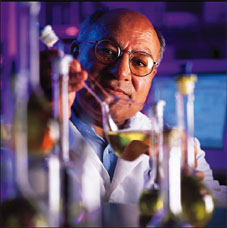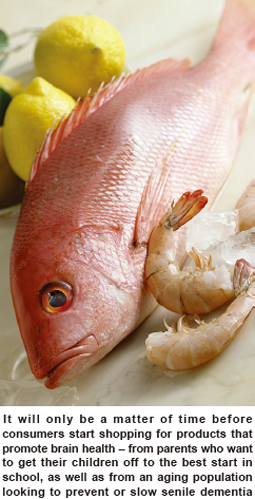
The right nutrients can help the brain cells and promote brain metabolism by restoring phospholipids content and regulation of neuron membrane excitability , writes R A M C H A U D H A R I

IT IS EASY to take the brain for granted. The brain, however, is the most important organ in the human body, automatically performing the most complex functions, and keeping us alive. It is the centerpiece of the nervous systems that regulates all functions from the beating of the heart to the maintenance of body temperature. Moreover, the brain is the body''s headquarters for cognition, memory and mood. The brain consists of billions of interconnecting nerve cells through which tiny electrical currents flow in any of a vast number of possible pathways via neurotransmitters. The well-protected but delicate human brain is constantly under attack. Stress, environmental pollution, internal toxicity and dietrelated nutrient deficiencies all take their toll. Impairment to mental acuity, verbal and visual memory, as well as symptoms of dementia and the lack of the sense of well-being are just a few of the resulting conditions. The right nutrients can help, particularly those that feed the brain cells and promote brain metabolism by restoring phospholipid content and regulation of neuron membrane excitability. Our fascination with the body has led to a wealth of recommendations on nutritional requirements for normal growth, but there have been fewer and lesser-known recommendations for feeding our brain. Today, the increasing focus on both ends of the lifecycle ?promoting healthy babies and preserving memory function for seniors ?is shedding light on several functional ingredients that may impact brain performance and emotional balance. Some nutrients absorbed during stages of early development may even offer long-term benefit. Brain health and early cognition The most important period of development of the central nervous system begins before birth and continues until a child is three years old. During this period thousands of neuron connections are formed: 70% of the brain develops during the foetal stage and the remaining 30% during the pre-school period. Neurons are more susceptible than the other cells of the body to both deficiencies and excesses. A growing body of research points to the impact a mother''s diet can have on prenatal brain development and the child''s brain performance years after birth. In general, the investigation of the impact of nutrition on cognitive development in children is still in its early stages. This impact must depend on when the intake (or deficiency) occurs in terms of brain development. The various parts of the brain develop and mature at different rates. The close relationship between some nutrients listed below and cognition has been investigated in great detail generally by supplementation studies in children presenting the deficiency:

Iron. According to the World Health Organisation (WHO), iron deficiency is very common and can lead to impaired brain function and immunocompetence. Iron supplementation can increase the mental development scope of anaemic children. Even if they do not display any signs of anaemia, the children of mothers with iron deficiency will have lower iron levels and/or very soon develop iron deficiencies themselves. Zinc. The mechanism of zinc is not yet clear, but it seems to modulate the transmission of nerve signals. What is clear is that zinc plays a role in cell growth and neurological development . Zinc deficiency during the embryonic and postnatal periods may result in a wide range of malformations of the nervous system. Folic Acid. The synthesis of various neurotransmitters requires a large number of the B-group vitamins (B1, B2, B6, folic acid and B12). Folic acid deficiency is particula
Sneakers The right nutrients can help the brain cells and promote brain metabolism by restoring phospholipids content and regulation of neuron membrane excitability , writes R A M C H A U D H A R I
The right nutrients can help the brain cells and promote brain metabolism by restoring phospholipids content and regulation of neuron membrane excitability , writes R A M C H A U D H A R I  IT IS EASY to take the brain for granted. The brain, however, is the most important organ in the human body, automatically performing the most complex functions, and keeping us alive. It is the centerpiece of the nervous systems that regulates all functions from the beating of the heart to the maintenance of body temperature. Moreover, the brain is the body''s headquarters for cognition, memory and mood. The brain consists of billions of interconnecting nerve cells through which tiny electrical currents flow in any of a vast number of possible pathways via neurotransmitters. The well-protected but delicate human brain is constantly under attack. Stress, environmental pollution, internal toxicity and dietrelated nutrient deficiencies all take their toll. Impairment to mental acuity, verbal and visual memory, as well as symptoms of dementia and the lack of the sense of well-being are just a few of the resulting conditions. The right nutrients can help, particularly those that feed the brain cells and promote brain metabolism by restoring phospholipid content and regulation of neuron membrane excitability. Our fascination with the body has led to a wealth of recommendations on nutritional requirements for normal growth, but there have been fewer and lesser-known recommendations for feeding our brain. Today, the increasing focus on both ends of the lifecycle ?promoting healthy babies and preserving memory function for seniors ?is shedding light on several functional ingredients that may impact brain performance and emotional balance. Some nutrients absorbed during stages of early development may even offer long-term benefit. Brain health and early cognition The most important period of development of the central nervous system begins before birth and continues until a child is three years old. During this period thousands of neuron connections are formed: 70% of the brain develops during the foetal stage and the remaining 30% during the pre-school period. Neurons are more susceptible than the other cells of the body to both deficiencies and excesses. A growing body of research points to the impact a mother''s diet can have on prenatal brain development and the child''s brain performance years after birth. In general, the investigation of the impact of nutrition on cognitive development in children is still in its early stages. This impact must depend on when the intake (or deficiency) occurs in terms of brain development. The various parts of the brain develop and mature at different rates. The close relationship between some nutrients listed below and cognition has been investigated in great detail generally by supplementation studies in children presenting the deficiency:
IT IS EASY to take the brain for granted. The brain, however, is the most important organ in the human body, automatically performing the most complex functions, and keeping us alive. It is the centerpiece of the nervous systems that regulates all functions from the beating of the heart to the maintenance of body temperature. Moreover, the brain is the body''s headquarters for cognition, memory and mood. The brain consists of billions of interconnecting nerve cells through which tiny electrical currents flow in any of a vast number of possible pathways via neurotransmitters. The well-protected but delicate human brain is constantly under attack. Stress, environmental pollution, internal toxicity and dietrelated nutrient deficiencies all take their toll. Impairment to mental acuity, verbal and visual memory, as well as symptoms of dementia and the lack of the sense of well-being are just a few of the resulting conditions. The right nutrients can help, particularly those that feed the brain cells and promote brain metabolism by restoring phospholipid content and regulation of neuron membrane excitability. Our fascination with the body has led to a wealth of recommendations on nutritional requirements for normal growth, but there have been fewer and lesser-known recommendations for feeding our brain. Today, the increasing focus on both ends of the lifecycle ?promoting healthy babies and preserving memory function for seniors ?is shedding light on several functional ingredients that may impact brain performance and emotional balance. Some nutrients absorbed during stages of early development may even offer long-term benefit. Brain health and early cognition The most important period of development of the central nervous system begins before birth and continues until a child is three years old. During this period thousands of neuron connections are formed: 70% of the brain develops during the foetal stage and the remaining 30% during the pre-school period. Neurons are more susceptible than the other cells of the body to both deficiencies and excesses. A growing body of research points to the impact a mother''s diet can have on prenatal brain development and the child''s brain performance years after birth. In general, the investigation of the impact of nutrition on cognitive development in children is still in its early stages. This impact must depend on when the intake (or deficiency) occurs in terms of brain development. The various parts of the brain develop and mature at different rates. The close relationship between some nutrients listed below and cognition has been investigated in great detail generally by supplementation studies in children presenting the deficiency:  Iron. According to the World Health Organisation (WHO), iron deficiency is very common and can lead to impaired brain function and immunocompetence. Iron supplementation can increase the mental development scope of anaemic children. Even if they do not display any signs of anaemia, the children of mothers with iron deficiency will have lower iron levels and/or very soon develop iron deficiencies themselves. Zinc. The mechanism of zinc is not yet clear, but it seems to modulate the transmission of nerve signals. What is clear is that zinc plays a role in cell growth and neurological development . Zinc deficiency during the embryonic and postnatal periods may result in a wide range of malformations of the nervous system. Folic Acid. The synthesis of various neurotransmitters requires a large number of the B-group vitamins (B1, B2, B6, folic acid and B12). Folic acid deficiency is particulaSneakers
Iron. According to the World Health Organisation (WHO), iron deficiency is very common and can lead to impaired brain function and immunocompetence. Iron supplementation can increase the mental development scope of anaemic children. Even if they do not display any signs of anaemia, the children of mothers with iron deficiency will have lower iron levels and/or very soon develop iron deficiencies themselves. Zinc. The mechanism of zinc is not yet clear, but it seems to modulate the transmission of nerve signals. What is clear is that zinc plays a role in cell growth and neurological development . Zinc deficiency during the embryonic and postnatal periods may result in a wide range of malformations of the nervous system. Folic Acid. The synthesis of various neurotransmitters requires a large number of the B-group vitamins (B1, B2, B6, folic acid and B12). Folic acid deficiency is particulaSneakers













